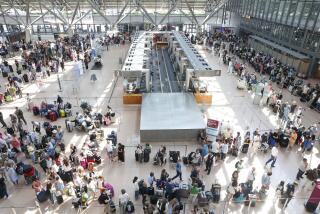Braced for the Bug
- Share via
Consider this: The Y2K New Year is seconds away. Many planes are grounded. Trains and subways aren’t running. Hundreds of thousands of business and university computers are down. A number of shipping ports are idle. Elected officials and police and fire department administrators are hunkered down in their emergency command centers. One nation has nearly 200,000 police and troops on alert. American and Russian military officers monitor nuclear missiles at special joint stations.
This might sound extreme, but it’s all a matter of sensible choice and design. Call it a worldwide watchdog interlude based as much on assuaging the public’s fears as it is on avoiding potential problems. So, train systems ranging from Amtrak to the French and German national railways will be stopped for roughly 20 minutes, slightly before and after midnight. Japan will have its police and troops ready, and so on.
There has never been anything like this. Worldwide Y2K expenditures might top $1 trillion, according to State Department officials and the Society for Information Management. That’s the largest financial outlay ever for a single event. You could tally up the costs of German reunification, the Persian Gulf War, the NATO bombing campaign against Serbia, worldwide damage from El Nino, the IMF bailout of Russia and the two costliest natural disasters in American history and still fall short of the Y2K estimate. That’s some price for the want of two more digits that would enable computers to register 00 as the year 2000, not 1900.
Much of 1999 was spent mulling and planning for such worst-case scenarios as economic failures and crowded airliners falling from the skies. But this much is certain. A number of so-called Y2K trigger dates that were supposed to have mimicked the millennium bug’s effects have come and gone without so much as a ripple. There has been an unprecedented amount of research, replacement and testing, particularly in the United States. The nation is as prepared as possible for what might turn out to be an inconsequential event.
Perhaps the biggest concern among informed Americans, aside from followers of conspiracies or apocalyptic thinking, is how the other nations weather the changeover. Much of Europe, with the potential exception of Italy and some former Eastern bloc nations, is considered well prepared. Asia, less so. In this hemisphere, Venezuela, with a vulnerable power grid, might be a trouble spot. The potential ripple effect of problems abroad could involve the United States in trade and economic disruptions, not to mention possible requests for assistance from nations staggered by Y2K.
Parts of the world may be sweating it out, but Americans can do their watching and waiting with a reasonable degree of confidence.
More to Read
Sign up for Essential California
The most important California stories and recommendations in your inbox every morning.
You may occasionally receive promotional content from the Los Angeles Times.













